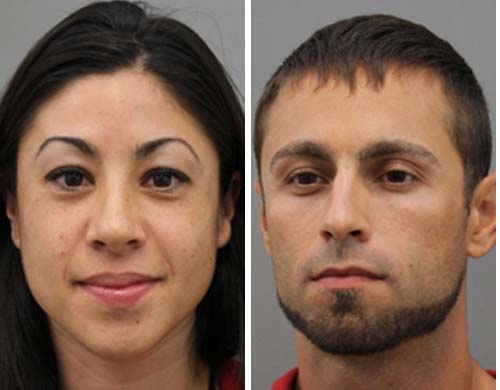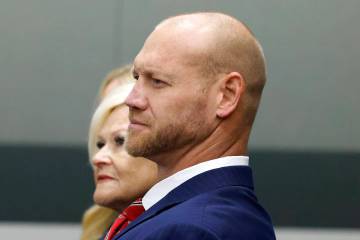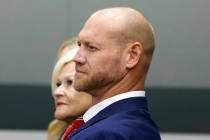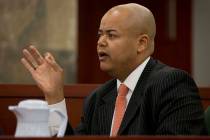Teacher’s arrest based on discriminatory law, civil rights advocates say
If she were a man, Bambi Dewey would never have been arrested.
The Henderson teacher, facing charges on accusations of having sex with a teenage girl, was arrested on an outdated, possibly unconstitutional law that discriminates against homosexuals, civil rights advocates say. (Related story)
Much has been written on the scandal involving Dewey, 32, and John Stalmach, 31, Clark County School District teachers arrested earlier this month on accusations they had three-way sex with a 16-year-old girl who is her former student.
Less attention was paid to the sole charge Henderson police cited in arresting Dewey, "solicitation of a minor to engage in acts constituting crime against nature," a holdover from the days when Nevada banned anal and oral sex.
Under current Nevada law, the age of consent for any form of heterosexual sex is 16. And anyone older than 18 is free to undertake any form of consensual sexual activity in private with anyone else, regardless of gender.
But Dewey was charged under a rarely enforced law that bans homosexual activity for anyone younger than 18.
That means a 30-year-old man can legally have sex with a 16-year-old girl, but a 30-year-old woman doing the same could face a felony conviction and up to life in prison. It also means that two 16-year-olds could be prosecuted for engaging in homosexual acts, while a boy and girl having sex at that age face no legal restrictions at all.
"This has to be fixed by the courts or the Legislature," said Allen Lichtenstein, general counsel of the Nevada ACLU. "The question of adults having sex with minors cannot be dependent on whether it's gay or straight. That's an equal contention problem."
But the law is so rarely used that the ACLU hasn't had a chance to question its validity in court.
"It doesn't appear to happen very often," Lichtenstein said. "Sometimes an overzealous prosecutor may want to look at something they believe has to be illegal and say, 'Here's the justification.' "
Nevada ACLU Executive Director Dane Claussen said he knows of only one other current prosecution of the law anywhere in the state.
"We would have brought a challenge ourselves if we had a client," he said.
State Sen. David Parks, D-Las Vegas, author of a 2009 law that allows domestic partnerships in Nevada, said he was surprised to see police trying to enforce the anti-homosexual law. He said he's discussed with other legislators and with gay rights advocates efforts to repeal it, but it hasn't been a high priority.
"I am surprised because it repeatedly had been said in discussions that it was an unused, not-cited statute," Parks said. "This was one of the really archaic statutes I had looked at trying to revise, to, you know, bring us into the 21st century."
'INFAMOUS' CRIMES
It was last century, in fact, when Nevada lawmakers repealed most "infamous crimes against nature" laws.
Until 1977, oral and anal sex in Nevada was a felony, regardless of the genders of the people involved. That year the ban was ended for mixed-gender couples. It wasn't until 1993 that sodomy laws for all adults were repealed.
Robert Langford, a defense lawyer who works with the ACLU, said there was a concerted effort to get rid of laws that punish homosexuality - except the one regarding minors.
"I guess it's just leftover prejudice," Langford said. "That's the only thing you can say. It is at best, on part of the Legislature, malfeasance to still have it on the books."
The law is likely unconstitutional anyway, advocates say. In its 2003 decision in Lawrence v. Texas, the U.S. Supreme Court ruled that states cannot outlaw sodomy or make a distinction between gay and straight sex.
Lichtenstein said the Supreme Court's ruling clearly applies.
"(Nevada's law) won't withstand constitutional scrutiny," he said. "The sex would otherwise be legal, but it's illegal this time because it's gay sex. That's clearly what Lawrence v. Texas was referencing."
Despite the ruling, the law in Nevada has only gotten stronger. During an effort a few years ago to strengthen laws related to registered sex offenders, the Legislature also increased penalties for the "crimes against nature." Legislative meeting minutes indicate discussion at the time focused on sex offenders, with no consideration of discrimination by sexual orientation.
The ACLU says the law, which aims to protect children, may hurt gay youths if authorities make arrests that cause embarrassment but result in no charges by prosecutors who have little faith that courts will uphold a conviction.
A case in Northern Nevada may prove that point. A 16-year-old Elko boy was charged this year with crimes against nature after a parent learned of a homosexual encounter with two other boys, one 16 and the other 14, Nevada ACLU lawyer Staci Pratt said.
Only one of the boys was charged, Pratt said, which is itself problematic.
"I wonder about the selective prosecution of one individual rather than all the individuals involved," she said. "I worry that fear issues within local communities make this selective prosecution more likely to occur.
"It's definitely time to get this off the books."
'WHAT LAWS TO ENFORCE'
Dewey's arrest in Henderson closely resembles a Las Vegas police case almost 12 years ago.
Las Vegas police Detective Vinten Hartung was arrested by his own department on the "crimes against nature" charge in 2000 after having sex with a 16-year-old boy he met on the Internet.
"I'm uncomfortable charging anyone with that law," then-Deputy Chief Ray Flynn said. "And I believe that law may have problems down the road because it discriminates against a group of individuals.
"But that's my personal opinion," Flynn said at the time. "It's not up to us to decide what laws to enforce."
Prosecutors declined to press charges against Hartung.
"We in essence concluded neither the state nor the federal authorities are able to pursue the sexual offenses," said Stewart Bell, who was then Clark County district attorney. "It discriminates against a class of people, and that's not allowed under the equal protection clause of the Constitution."
It remains to be seen what will happen in Dewey's case. A district attorney's office spokeswoman said the case was still under review on Friday. Henderson police declined to comment.
But even if prosecutors decline to charge Dewey, her arrest exposed intimate details of her sex life to the public. That can't be reversed.
The same thing happened in North Carolina in 2008, when Nelson Sloan, 40, was arrested by the Raleigh Police Department under that state's "crime against nature" statute for consensual sex with another man.
North Carolina is one of about a dozen states that still have sodomy laws on the books, according to blog equalitymatters.org.
Prosecutors dropped the case, citing the 2003 Supreme Court decision, but Sloan's life changed forever.
"As long as this law remains on the books, it is a crime punishable by an arrest, a stay in jail, media attention and a fine of $450," Sloan said in a written statement after being cleared. "I have never been so humiliated in all my life," he said. "It's just awful."
Researcher Brian Gaw contributed to this report. Contact reporter Mike Blasky at mblasky@reviewjournal.com or 702-383-0283.
Related Story
Old case left loophole for teacher sex




























